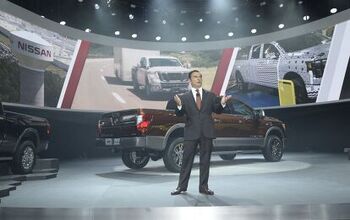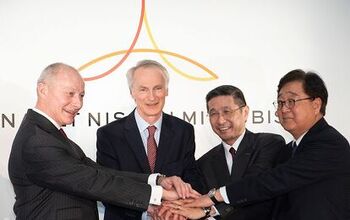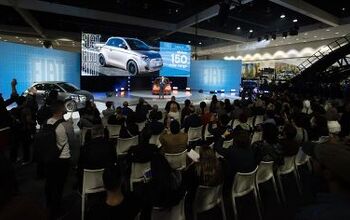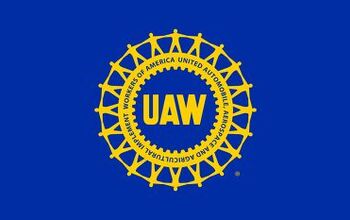Renault-Nissan Rethinking Their Relationship
In an extended interview with Reuters, Nissan-Renault CEO Carlos Ghosn talks about the balancing act of leading two global automakers while maintaining their unique identities, a balance Ghosn says he wants to try to preserve even as the alliance looks to restructure its capital. Renault’s 44.3% stake in Nissan has caused some trouble with financial analysts because, as Ghosn puts it,
we are challenged (by financial markets) over how much capital we have imprisoned into the structure of the alliance. It’s a fair challenge. We are going to be studying and analyzing this with outsiders also, what are the ways to respond to these expectations from the financial markets without challenging the operating model which consists of keeping the two companies vibrant, motivated, engaged and keeping their identities
Does that mean a full merger? A new corporate structure? Where is Ghosn looking for answers as he attempts to give the markets what they want while maintaining the delicate balance between the needs of his two firms?
On one point, Ghosn seems to be clear: a full merger is not in the works.
We will be reviewing the financial structure not to end up with a merger … but to respond to the main concern of investors saying, “Maybe you’re using too much capital for your financial structure.” Every single time you make a merger, somebody is losing his identity. And saying something different is just rubbish. It is not validated by any example in the car industry that this works. Not one example. So that’s why we’re trying to avoid this by saying we want two companies which are vibrant, proud, eager for their own performance but at the same time, which want synergies.
Ghosn refused to give more details, saying the issue needs closer study, but analysts suggest that the main alternative to a merger would be a divestment by Renault of its large stake in Nissan. After all, Renault needs only a third of the Japanese automaker’s equity to maintain control, and Nissan owns only 15 percent of Renault. This would free up cash while leaving the alliance largely intact in its current form.
Meanwhile, Ghosn’s term as Nissan CEO is up this year, but the Brazilian-Lebanese dynamo says he’d like to stay on head of Nissan through the end of his term as Renault CEO, which ends in 2014.Says Ghosn:
As long as I’m heading Renault, I would like to propose that I continue to head Nissan because I think it’s good for Nissan to have the same CEO. It guarantees partnership, the same level of decision.
And if he has to pick someone else for the Nissan CEO job?
Definitely it should be somebody who is recognized at Nissan. That’s number one. Personally I have a preference for a Japanese. (But) this doesn’t depend on me because the shareholders have their own say.
And Ghosn’s emphasis on Japan is not coincidental, as he explains that, while Toyota and others run from Japanese production, Nissan has embraced production in the Yen zone.
My main resources, my main strengths, my main talents and expertise are in Japan. On the other side, we’re going to have to deal with unfavorable exchange rates for a while. So in function of these two elements, and our sales forecast — fortunately for us, we are in a strong growth — we are envisioning that we will be producing more than 1 million cars in Japan (a year) for the foreseeable future, even at this exchange rate level. With the strong growth, I need capacity. Because we are growing, thanks to the emerging markets and thanks to our investments in China, Russia, etc, and in the Middle East, we need this capacity in Japan. If the yen goes to 90, 95, 100 yen (to the dollar), then the 1 million is going to be a piece of cake. If it’s stuck at 80 or 85, it’s going to be tough.
The question: if Renault unlocks its equity in Nissan, will investors go for it, despite many concerns about the Japanese currency? Ghosn hopes to make a move on the alliance’s capital structure by 2013.
More by Edward Niedermeyer
Latest Car Reviews
Read moreLatest Product Reviews
Read moreRecent Comments
- Jkross22 When I think about products that I buy that are of the highest quality or are of great value, I have no idea if they are made as a whole or in parts by unionized employees. As a customer, that's really all I care about. When I think about services I receive from unionized and non-unionized employees, it varies from C- to F levels of service. Will unionizing make the cars better or worse?
- Namesakeone I think it's the age old conundrum: Every company (or industry) wants every other one to pay its workers well; well-paid workers make great customers. But nobody wants to pay their own workers well; that would eat into profits. So instead of what Henry Ford (the first) did over a century ago, we will have a lot of companies copying Nike in the 1980s: third-world employees (with a few highly-paid celebrity athlete endorsers) selling overpriced products to upper-middle-class Americans (with a few urban street youths willing to literally kill for that product), until there are no more upper-middle-class Americans left.
- ToolGuy I was challenged by Tim's incisive opinion, but thankfully Jeff's multiple vanilla truisms have set me straight. Or something. 😉
- ChristianWimmer The body kit modifications ruined it for me.
- ToolGuy "I have my stance -- I won't prejudice the commentariat by sharing it."• Like Tim, I have my opinion and it is perfect and above reproach (as long as I keep it to myself). I would hate to share it with the world and risk having someone critique it. LOL.

































Comments
Join the conversation
I havent gotten the point of Nissan / Renault. Back in 97-02 it was Nissan being picked up by the french as a way for them to expand and Nissan not to go into the crapper. The french fixed the size and vehicle issues for Nissan, ntm provided them with stability and more importantly MONEY. In the beginning, Nissan was a DESIGN based company (more than Toyota / Honda) which pushed out the Altima / Maxima / Z followed by the Murano and or Xterra. Now all of said cars are OLD with the Z being refreshed.. and I dont see a point for half. Has Nissan last their design point, or has their move from California to Tennesee hampered their ability to be aggressive in design? The whole point of attaching to the french.. gives them money, but what did the french get out of it? They gave Nissan the Versa / Sentra and or maybe the Rogue / Cube / Juke and it leaves them without a car smaller than Maxima / Altima, better than Sentra and just a bit larger. Its just not making much sense... But Im also not a CEO. GHOSN was viewed as a savior of the company.. much like Lido was (before it was viewed that he RAPED and ABUSED Chrysler almost as much as he helped them.) So is he a power hunger monger who wants to create the next multibrand conglomerate that echos VW Group / Fiat Group... or is he just failing at the follow through?
Two large companies...both with serious shortfallings. Nissan...has had a dearth of imagination since the departure of Yutaka Katayama in the 1970s. It had been controlled with bean-counters the likes of which ran Ford into the ditch in the 1970s. As befitting Japanese standards, they were flawless in manufacture, but dull as tap water. Renault...words fail me. Renault disappeared from these shores in 1988 and the cars left behind disappeared about as quickly. It wasn't JUST that they were clueless enough to team up with an American company short of capital, with an image problem, with a disgruntled too-small dealer network. They transplanted the Renault 9 to AMC's plant...and the cars held up about as well as the pathetic imported Le Cars did. It was Strike Three. First was the Dauphine; then the R 10; and finally, to prove it to the doubters, the self-destructo Alliance/Encore. Nissan, under Renault, had a transplant of imagination that brought imaginative product to technological excellence. But IMHO, Nissan has done well this way in that they've KEPT the best of their corporate culture. Will Nissan function without Renault? Who knows? Depends on retaining key people and on how much the corporate culture has changed. But a combined Renault-Nissan corporation, would probably be a mistake. The dominant company would be Renault, with their corner-cutting in engineering and manufacturing and their institutional preference for things French. This is not the time when a company that makes throwaway cars can prosper.